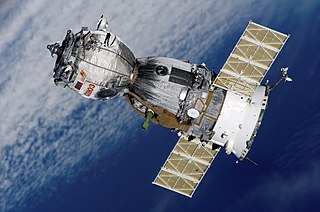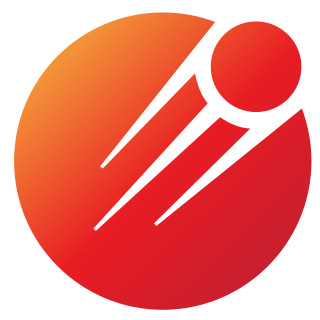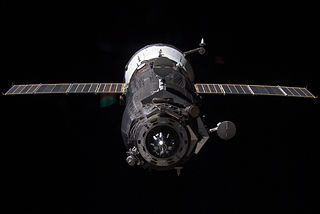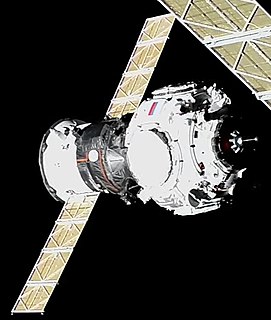Related Research Articles

Soyuz is a series of spacecraft which has been in service since the 1960s, having made more than 140 flights. It was designed for the Soviet space program by the Korolev Design Bureau. The Soyuz succeeded the Voskhod spacecraft and was originally built as part of the Soviet crewed lunar programs. It is launched on a Soyuz rocket from the Baikonur Cosmodrome in Kazakhstan. Between the 2011 retirement of the Space Shuttle and the 2020 demo flight of SpaceX Crew Dragon, the Soyuz served as the only means to make crewed space flights and to reach the International Space Station, for which it remains heavily used.

The Progress is a Russian expendable cargo spacecraft. Its purpose is to deliver the supplies needed to sustain a human presence in orbit. While it does not carry a crew, it can be boarded by astronauts when docked to a space station, hence it is classified as crewed by its manufacturer. Progress is derived from the crewed Soyuz spacecraft and launches on the same launch vehicle, a Soyuz rocket.

PAO S. P. Korolev Rocket and Space Corporation Energia, also known as RSC Energia, is a Russian manufacturer of ballistic missile, spacecraft and space station components. The company is the prime developer and contractor of the Russian crewed spaceflight program; it also owns a majority of Sea Launch. Its name is derived from Sergei Korolev, the first chief of its design bureau, and the Russian word for energy.
Human spaceflight programs have been conducted, started, or planned by multiple countries and companies. Until the 21st century, human spaceflight programs were sponsored exclusively by governments, through either the military or civilian space agencies. With the launch of the privately funded SpaceShipOne in 2004, a new category of human spaceflight programs – commercial human spaceflight – arrived. As of July 2021, three countries and one private company (SpaceX) have launched humans to Earth orbit, and two private companies have launched humans on a suborbital trajectory. The criteria for what constitutes human spaceflight vary. The Fédération Aéronautique Internationale defines spaceflight as any flight over 100 kilometers (62 mi). In the United States professional, military, and commercial astronauts who travel above an altitude of 80 kilometers (50 mi) are awarded the United States Astronaut Badge. This article follows the FAI definition of spaceflight.
Kosmos is a designation given to many satellites operated by the Soviet Union and subsequently Russia. Kosmos 1, the first spacecraft to be given a Kosmos designation, was launched on 16 March 1962.

Uncrewed spaceflights to the International Space Station (ISS) are made primarily to deliver cargo, however several Russian modules have also docked to the outpost following uncrewed launches. Resupply missions typically use the Russian Progress spacecraft, European Automated Transfer Vehicles, Japanese Kounotori vehicles, and the American Dragon and Cygnus spacecraft. The primary docking system for Progress spacecraft is the automated Kurs system, with the manual TORU system as a backup. ATVs also use Kurs, however they are not equipped with TORU. Progress and ATV can remain docked for up to six months. The other spacecraft — the Japanese HTV, the SpaceX Dragon and the Northrop Grumman Cygnus — rendezvous with the station before being grappled using Canadarm2 and berthed at the nadir port of the Harmony or Unity module for one to two months. Under CRS phase 2, Cargo Dragon will dock autonomously at IDA-2 or 3 as the case may be. As of November 2021, Progress spacecraft have flown most of the uncrewed missions to the ISS.

Pirs(Russian: Пирс, meaning "pier") – also called Stykovochny Otsek 1 and DC-1 – was a Russian module on the International Space Station (ISS). Pirs was launched on 14 September 2001, and was located on the Zvezda module of the station. It provided the ISS with one docking port for Soyuz and Progress spacecraft, and allowed egress and ingress for spacewalks by cosmonauts using Russian Orlan space suits. Pirs was docked to Zvezda for almost 20 years, until 26 July 2021, where it was decommissioned and undocked by Progress MS-16 to make way for the new Nauka module.
Orel or Oryol, formerly Federation, and PPTS, is a project by Roscosmos to develop a new-generation, partially reusable crewed spacecraft.

Progress M1-5 was the Progress spacecraft which was launched by Russia in 2001 to deorbit the fifteen-year-old Mir space station in a controlled fashion over a remote ocean area, far away from shipping lanes - otherwise Mir's orbit would have decayed uncontrolled over time, with debris potentially landing in a populated area. The Russian Aviation and Space Agency, Rosaviakosmos, was responsible for the mission.

Progress M-08M, identified by NASA as Progress 40P, is a Progress spacecraft which was used to resupply the International Space Station. It was the eighth Progress-M 11F615A60 spacecraft to be launched, the fifth for the year 2010. The spacecraft was manufactured by RKK Energia, and was operated by the Russian Federal Space Agency. It arrived at the space station on 30 October 2010 whilst the Expedition 25 crew was aboard, and departed during Expedition 26 on 24 January 2011.

Progress M-09M, identified by NASA as Progress 41P, is a Progress spacecraft which was launched in 2011 to resupply the International Space Station. It was the ninth Progress-M 11F615A60 spacecraft to be launched, and has the serial number 409. The spacecraft was manufactured by RKK Energia, and is operated by the Russian Federal Space Agency. It arrived at the space station during Expedition 26, and undocked during Expedition 27.

Progress M-12M, identified by NASA as Progress 44P, was an uncrewed Progress spacecraft that was lost in a launch failure on 24 August 2011, at the start of a mission to resupply the International Space Station. It was the twelfth modernised Progress-M spacecraft to be launched. Manufactured by RKK Energia, the spacecraft was to have been operated by the Russian Federal Space Agency.

Progress M-13M, identified by NASA as Progress 45P, is a Progress spacecraft which reached the International Space Station (ISS) on 2 November 2011. The Progress M-13M spacecraft lifted off from the Baikonur Cosmodrome in Kazakhstan at 10:11 UTC on 30 October 2011, starting off the 45th uncrewed Russian space station resupply mission. The spacecraft was manufactured by RKK Energia, and is operated by the Russian Federal Space Agency. The Soyuz-U rocket carrying the cargo ship functioned nominally as advertised. Approximately nine minutes into the launch, Progress M-13M reached its planned preliminary orbit.

Prichal nodal module also known as Uzlovoy Module or UM is a Russian spacecraft which is part of the International Space Station (ISS). It was approved in 2011 and was launched on 24 November 2021, at 13:06:35 UTC, atop Progress M-UM, with operations beginning in 2022. Originally, the nodal module was intended to serve as the only permanent element of the future Orbital Piloted Assembly and Experiment Complex (OPSEK), but those plans were scrapped in 2017.
A number of different spacecraft have been used to carry cargo to and from space stations.

Progress MS-08, identified by NASA as Progress 69P, is a Progress spacecraft used by Roscosmos to resupply the International Space Station (ISS).

Soyuz MS-14 was a Soyuz spaceflight to the International Space Station. It carried no crew members, as it was intended to test a modification of the launch abort system for integration with the Soyuz-2.1a launch vehicle. It launched successfully on 22 August 2019 at 03:38 UTC. It was the first mission of the Soyuz crew vehicle without a crew in 33 years, and the first ever unpiloted mission of Soyuz to the ISS.
Argo is a proposed Russian reusable cargo spacecraft being developed by Reusable Space Transport Systems (MTKS), a private company.

Progress M-UM, is a specially modified Progress M 11F615A55, Russian production No.303, developed by Roscosmos to deliver the Prichal module to the Russian Orbital Segment (ROS) of the International Space Station (ISS). It was launched on 24 November 2021 at 13:06:35 UTC, along with a Progress M propulsion compartment and has the pressurised cargo module removed to accommodate Prichal. This is the 171st flight of a Progress spacecraft. It is the final flight of a Progress M and the first launch of a Progress spacecraft on a Soyuz 2.1b.
References
- ↑ "Russia to develop cargo retrievable spacecraft Soyuz GVK". Devdiscourse.com. Retrieved 4 January 2019.
- ↑ "Dragon". SpaceX.com. 15 November 2012. Retrieved 4 January 2019.
- ↑ "РКК «Энергия»: старт беспилотного «Союза МС» планируется в августе 2019 года" [RKK Energia: launch of unmanned Soyuz MS is planned for August 2019] (in Russian). RKK Energia. 18 May 2018. Retrieved 28 December 2018.
- ↑ "Retrievable Progress GVK spacecraft". Russianspaceweb.com. Retrieved 4 January 2019.